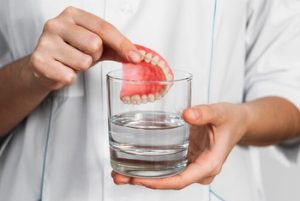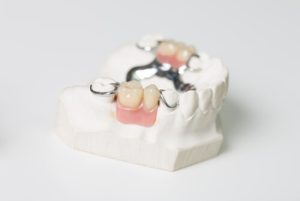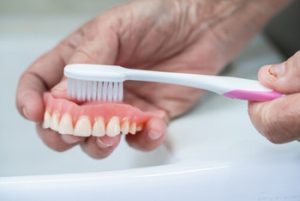Contents
Losing your natural teeth can be life-changing, but dentures offer a practical and restorative solution. They help bring back your smile, support your ability to chew and speak, and contribute to your overall oral health. One of the most common questions among patients is: how long do dentures last?
In this article, we’ll explore the average lifespan of dentures, what affects their longevity, how to care for them properly, and when it might be time to consider replacement or an alternative like implant-supported dentures.
What to Expect From the Lifespan of Dentures
Dentures are prosthetic devices designed to replace missing teeth. They come in various forms, including full dentures, partial dentures, and implant-supported options. While they can greatly improve daily function, they are not designed to last forever.
So, how long do dentures really last?
On average, dentures last between five to ten years. This estimate can vary based on several factors:
- The type of dentures
- The materials used in fabrication
- How well they are cared for
- Changes in the jaw and gum tissue
- Daily usage and habits
Even with excellent maintenance, dentures will wear down over time or become ill fitting due to natural changes in your mouth.
Exploring the Types of Dentures and Their Durability
There are different denture options available, each with expected lifespan and maintenance requirements.
Full dentures
Full dentures replace an entire arch of missing teeth. With normal use and proper care, they typically last between five and ten years. However, your gums and jawbone naturally shrink over time, which can cause the denture to feel loose and require replacement.
Partial dentures
Partial dentures are used when some natural teeth remain in the mouth. Removable partial dentures typically last five to seven years, although they might need adjustments or relining sooner if discomfort or looseness occurs.
 Immediate dentures
Immediate dentures
Immediate dentures are placed right after tooth extraction. These are often used as a temporary fix while your mouth heals. They may need to be replaced with a new denture within six to twelve months.
Implant-supported dentures
These are more durable and provide greater stability. While the dental implants themselves may last fifteen years or more, the dentures that connect to them generally need replacement or relining every seven to ten years.
Why Dentures Don’t Last Forever
Despite being custom-made in a dental lab to fit your mouth, dentures are affected by natural changes such as bone loss and gum shrinkage. These biological shifts can cause dentures to no longer fit properly, even if they are in good condition.
Common signs your dentures may need to be adjusted or replaced include:
- Clicking sounds when talking or eating
- Difficulty chewing certain foods
- Difficulty speaking clearly
- Dentures that feel loose or unstable
- Gum irritation or sore spots
- Pressure or discomfort in the jaw
These are clear indications that your dentures no longer fit properly and could benefit from relining or replacement.
How to Help Your Dentures Last Longer
While dentures will eventually need to be replaced, you can significantly extend their lifespan with proper care and maintenance.
Daily cleaning habits
- Clean dentures daily with a soft denture brush and non-abrasive cleanser
- Rinse them after eating to remove food debris and prevent plaque buildup
- Avoid hot water which can warp the material
- Soak your dentures overnight in water or a denture cleaning solution to keep them moist.
- Use a soft bristled toothbrush to clean your gums, tongue, and any remaining teeth.
Handling and storage
- Always handle dentures over a folded towel or water-filled sink to avoid damage if dropped.
- Don’t use household glues or try to fix broken dentures yourself
- If you wear dentures overnight, check with your dentist to ensure it’s appropriate
Regular dental checkups
Many patients assume they don’t need to see a dental professional once they have dentures, but that’s not true. Regular dental checkups are essential to ensure the dentures still fit properly and that your gums and oral tissues remain healthy.
Dentists also check for early signs of gum disease, bone loss, or other issues that could impact your overall health and the fit of your dentures.
Repair, Reline, or Replace?
Knowing the difference between when dentures can be repaired, relined, or need to be replaced helps you make the right choice for your oral health and comfort.
Denture repair
Cracks or breaks in dentures may be repaired by a dental technician, often in a short turnaround time. Never attempt to repair dentures at home. At this point, you’ll also have an opportunity to select the size, shape and color of your new teeth, and the specifications are then sent to a special lab that will fabricate the new dentures.
Denture reline
If your dentures feel loose but are otherwise in good condition, a reline may restore comfort and fit. This process reshapes the underside of the denture to fit your current gum tissue better.
Replacement dentures
If your dentures are more than seven years old or you’re experiencing chronic discomfort, sore spots, or changes in the way they fit, it’s likely time for a new pair.
Long-Term Solutions Beyond Traditional Dentures
Some people find traditional dentures increasingly uncomfortable or inconvenient over time. In these cases, alternatives like implant supported dentures can offer a more secure and long-lasting solution.
Dental implants
Dental implants are surgically placed into the jawbone and serve as stable anchors for artificial teeth. They can be used to support crowns, dental bridges, or full dentures. While more expensive initially, they offer a more permanent and natural-feeling solution for replacing missing teeth.
Practical Tips for Living Comfortably With Dentures
To maintain comfort and oral health while wearing dentures, keep these tips in mind:
- Avoid chewing very sticky or hard foods
- Stay hydrated to reduce dry mouth and friction
- Monitor your gums for redness, swelling, or pain
- Clean your mouth and dentures thoroughly every day
- Schedule dental appointments at least once a year, or more often if advised
If your dentures start causing discomfort or they begin to shift or move while eating, don’t ignore it. An improper fit can affect your ability to chew, lead to sore spots, and contribute to bone loss over time.
Final Thoughts
So, how long do dentures last? The average lifespan for most dentures is five to ten years, but this can vary widely depending on how well they are cared for, how your mouth changes, and the type of denture you use.
Many patients find that with proper maintenance and regular checkups, their dentures remain functional and comfortable for many years. However, dentures are not a permanent fix. Eventually, they require replacement or adjustment to continue supporting your comfort, oral health, and quality of life.
If your dentures feel loose, are causing discomfort, or you’ve had them for several years, it may be time to talk to your dentist about replacement options. Whether you choose new dentures or explore more stable solutions like dental implants, keeping your mouth healthy is the top priority.
Let your dental professional guide you toward the right option, so you can keep smiling, speaking, and enjoying your meals without worry.
References:
https://my.clevelandclinic.org/health/treatments/10900-dentures
https://www.polident.com/en-us/full-dentures/denture-care/how-long-do-dentures-last/
https://www.ncbi.nlm.nih.gov/books/NBK596306/
https://www.healthline.com/health/immediate-denture
https://www.nhs.uk/tests-and-treatments/dentures/

Leave a Reply